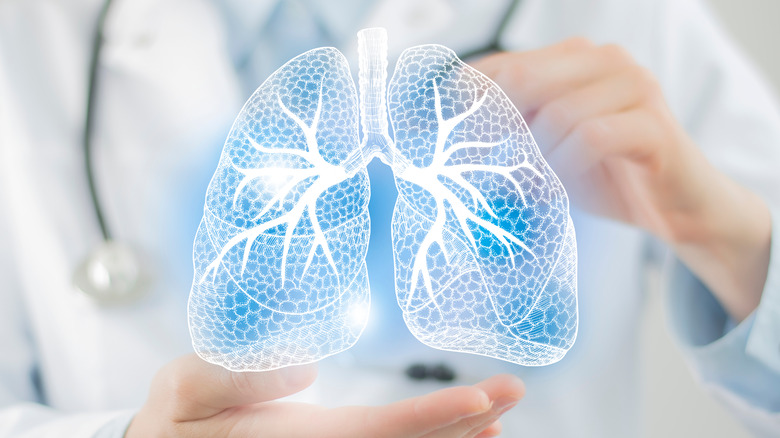Reasons Why There Is A Burning Sensation In Your Lungs
According to the American Lung Association (ALA), about 37 million Americans currently have some type of chronic lung illness. One of the most common lung diseases is lung cancer. Within the last four decades, the number of lung cancer cases has risen by 84% in females and dropped by 36% in males. ALA states that the leading reason for the increased risk of lung diseases is poor air quality because of air pollution.
Per Penn Medicine, there are several types of lung diseases. Some conditions affect the air pathways by narrowing or blocking the passage and causing difficulty in breathing, such as asthma or chronic obstructive pulmonary disease (COPD). Some lung circulation diseases affect the lungs' blood vessels, resulting in clotting or scarring, reports Penn Medicine. These conditions result in breathing problems and increase the risk of hypertension.
As per ALA, if you notice symptoms of lung diseases such as wheezing, persistent cough that lasts for weeks, mucus, coughing up blood, or severe pulmonary inflammation, it's vital to visit a doctor and seek medical help.
What causes burning in the lungs
A burning sensation in the lungs can be caused by various health conditions. Lung inflammation may sometimes be caused by gastroesophageal reflux disease (GERD) or heartburn (via MedicalNewsToday). According to a study published in the Annals of Thoracic Medicine, pulmonary irritation may be caused when acid travels back to the chest and, in the process, irritates the air passage, leading to severe discomfort and hoarseness.
Another reason for pulmonary inflammation may be an underlying chest infection, according to MedicalNewsToday. As per Mayo Clinic, pneumonitis (lung inflammation) is a chest condition resulting in persistent dry cough and shortness of breath. The term may be used to refer to infectious conditions like pneumonia as well as non-infectious causes of lung inflammation. It may eventually lead to severe inflammation in the chest. If you have a chest infection, you may also notice symptoms like fever, chills, and fatigue, reports MedicalNewsToday.
According to Cleveland Clinic, some people may also experience lung inflammation because of asthma attacks. Asthma is a lung disease that causes swelling in the lining of the air passage. As a result, the person may have difficulty breathing, mucus production, and severe chest irritation.


